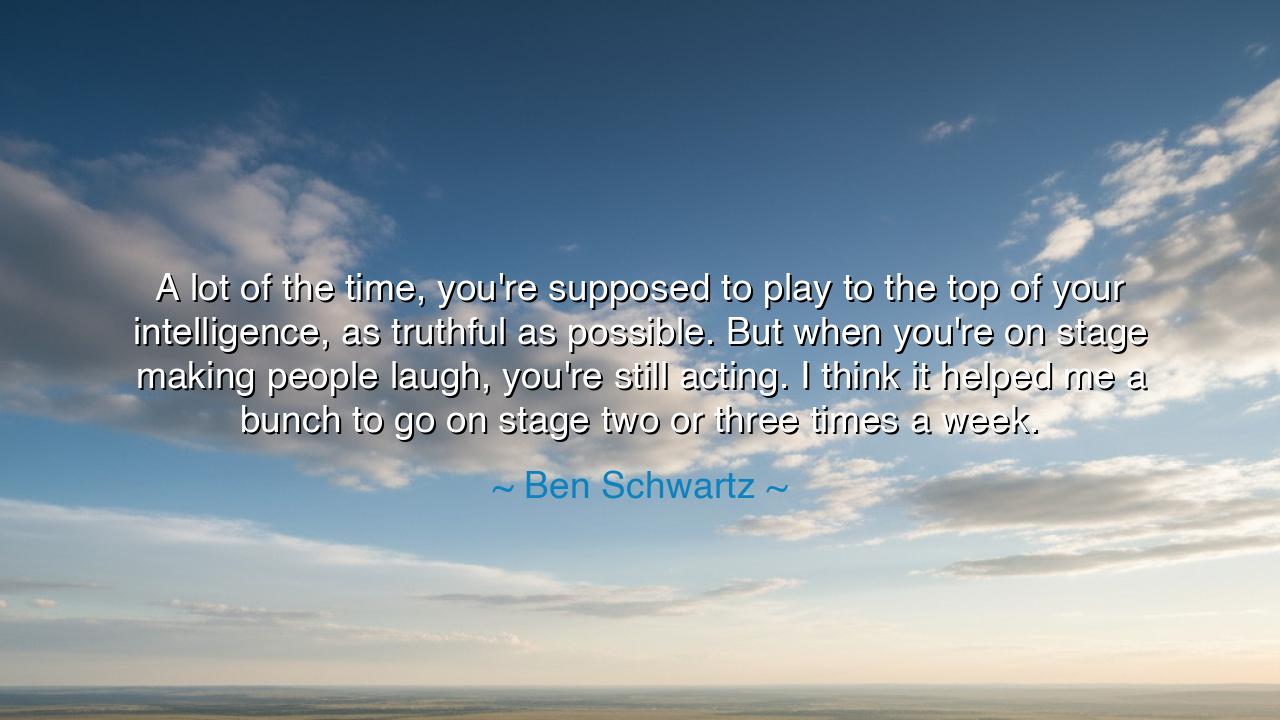
A lot of the time, you're supposed to play to the top of your
A lot of the time, you're supposed to play to the top of your intelligence, as truthful as possible. But when you're on stage making people laugh, you're still acting. I think it helped me a bunch to go on stage two or three times a week.





When Ben Schwartz, the actor, comedian, and improviser, said, “A lot of the time, you're supposed to play to the top of your intelligence, as truthful as possible. But when you're on stage making people laugh, you're still acting. I think it helped me a bunch to go on stage two or three times a week,” he spoke not only of comedy but of craft and the discipline of authenticity. His words, though wrapped in the language of performance, carry a deeper resonance—one that echoes the teachings of all who have ever sought truth through art. For what he describes is not merely the skill of making others laugh, but the eternal struggle to remain honest, present, and human in the act of creation.
The ancients, too, understood this paradox: that truth must often wear a mask to reveal itself. The great actors of Greece—disciples of Dionysus, god of theatre and transformation—performed with masks upon their faces, yet through those masks they revealed more of the soul than daily life ever could. What Ben Schwartz describes as “playing to the top of your intelligence” is the same pursuit of excellence that burned within those ancient performers: to speak and move with awareness, to express emotion not as mere pretense but as truth embodied. In this sense, the stage becomes not a place of deceit, but of revelation—where laughter and truth intertwine like twin flames.
Schwartz reminds us that even in comedy, where joy and absurdity reign, one must never descend into falsehood. For laughter born of truth is divine; laughter born of mockery or laziness is hollow. The great fools of history—the jesters, the satirists, the comic philosophers—always knew this. Consider Charlie Chaplin, whose silent films made the world laugh even as they whispered of loneliness, poverty, and the fragile dignity of man. His genius lay in his truthfulness. Every stumble of the Tramp, every tear behind the smile, came from a place of real humanity. Like Schwartz, Chaplin performed not as a trickster of laughter, but as a student of life, offering his art as both mirror and balm.
When Schwartz says that going on stage several times a week “helped him a bunch,” he speaks of the ancient law of practice—the sacred rhythm of repetition that transforms skill into wisdom. No artist, however gifted, becomes a master without the tempering of time and trial. The blacksmith must strike the metal again and again before the blade takes shape. So too must the artist—through constant effort—forge the union of intelligence and instinct. The laughter of a crowd is a fleeting sound, but the discipline that produces it builds character, humility, and courage. In that weekly ritual of performance, Schwartz was not merely entertaining; he was training his soul to be fearless before the eyes of others.
There is a quiet nobility in such work. For to stand before people and offer them laughter is to bear a sacred trust. The audience may not know it, but in that moment, the performer carries the weight of their weariness, their grief, their silent longing for connection. To play truthfully, as Schwartz says, is to honor that trust—to remind the world that even in comedy, there is something real, something shared. The laughter that rises from truth is not escape; it is communion—the joining of hearts through recognition.
Throughout history, those who mastered both truth and humor have been the wisest teachers. Socrates joked as he dismantled falsehood; Mark Twain used laughter to expose the absurdities of his age. They understood what Schwartz expresses simply: that comedy is not frivolity, but clarity disguised as joy. To make others laugh truthfully is to remind them, if only for a breath, of their own humanity.
So let this be the lesson for all who hear: whatever your craft, practice it truthfully. Do not perform to impress; perform to connect. Do not labor to appear intelligent; labor to be sincere. Whether you speak, paint, teach, or create, go to the stage of your life as Schwartz went to his—again and again, humbly, earnestly, seeking to play to the top of your intelligence and the depth of your heart. For in such practice lies not only mastery, but meaning.
And when you find yourself laughing—whether on stage or in life—remember that laughter born of truth is not a sign of foolishness, but of wisdom. It is the soul’s way of saying, “I see the world clearly, and still I choose to rejoice.”






AAdministratorAdministrator
Welcome, honored guests. Please leave a comment, we will respond soon